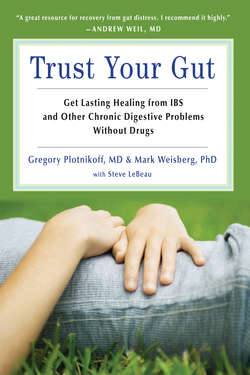Читать книгу Trust Your Gut - Gregory Plotnikoff - Страница 38
На сайте Литреса книга снята с продажи.
Why Fighting Symptoms Doesn't Work
ОглавлениеWhen you go on the offensive and try to fight your symptoms, it only makes them stronger. Try this: whatever you do, do not think of an elephant. What happens? The harder you try not to think of it, the elephant's image becomes even more prominent.
That's exactly what happens when you try the same game with a more emotionally charged topic: whatever you do, do not think of your gut distress. Instead of not thinking about your gut, your reactions become all the more amplified and disturbing. The harder you try to not think about the symptom, the more powerful the image. And the more powerful the image, the more likely you are to assign emotional value to it. Your body then responds automatically, unleashing multiple reactions, including the release of stress hormones and other factors that perpetuate or worsen gastrointestinal distress.
Say you get a burning pain in your upper abdomen every time you eat pizza. It's nothing new—a chronic problem. You've seen your doctor to rule out physical pathology. As you feel that all too frequent sensation, your body sends out a cascade of emotional and physiological processes in response.
First, your sympathetic nervous system shouts out for the release of stress hormones such as adrenaline (also called epinephrine) and cortisol as your primitive limbic brain mistakenly encodes the pain as a threat. Because emotions often express themselves in physical ways, when you then try to not feel this unwanted burning pain, you instinctively tighten the muscles and other tissue in the area where it hurts—and other areas of your body as well, perhaps far removed from the source of the pain. All of this makes the pain worse, sometimes even spreading to other parts of the body.
At the same time, conditioned learning occurs in your limbic brain; the next time you eat pizza and get that familiar burning pain, you're just a little more likely to automatically react with anxiety, anger, frustration, or despair. It's a difficult cycle, one that increases your suffering.
